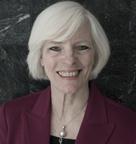- About Archives
- About SAA
- Careers
- Education
- Publications
- Advocacy
- Membership
 Professional Experience: Consultant, Eaton Consulting, 2007–present. Adjunct Professor, School of Information Studies, University of Wisconsin, Milwaukee, 2008–present. Change Management Officer, Electronic Records Archives Program (ERA), National Archives and Records Administration (NARA), 2002–2007. Director, Technical Services Division, Smithsonian Institution Archives, 1997–2002. Branch Chief, Technical Services Branch, Center for Electronic Records, NARA, 1990–1997. Asst. Branch Chief, Archival Services Branch, Center for Electronic Records, NARA, 1988–1989. Archivist, Machine-Readable Branch, NARA, 1986–1988. Archivist, Documentation Standards Staff, NARA, 1984–1986. Archivist, Office of Presidential Libraries, NARA, 1977–1984. Archives Technician, Archives of American Art, Smithsonian Institution 1976–1977.
Professional Experience: Consultant, Eaton Consulting, 2007–present. Adjunct Professor, School of Information Studies, University of Wisconsin, Milwaukee, 2008–present. Change Management Officer, Electronic Records Archives Program (ERA), National Archives and Records Administration (NARA), 2002–2007. Director, Technical Services Division, Smithsonian Institution Archives, 1997–2002. Branch Chief, Technical Services Branch, Center for Electronic Records, NARA, 1990–1997. Asst. Branch Chief, Archival Services Branch, Center for Electronic Records, NARA, 1988–1989. Archivist, Machine-Readable Branch, NARA, 1986–1988. Archivist, Documentation Standards Staff, NARA, 1984–1986. Archivist, Office of Presidential Libraries, NARA, 1977–1984. Archives Technician, Archives of American Art, Smithsonian Institution 1976–1977.
Education: Advanced Management Program, Information Resources Management College, National Defense University, Washington, D.C., 1997. MA, British History, University of Maryland, 1976. BA, History, University of Maryland, 1971.
Honors: Fellow of the Society of American Archivists, 1995. SAA Fellows' Ernst Posner Award, 1997.
Professional Activities: Society of American Archivists: 1979-present. “News Notes” co-editor, American Archivist, 1980–1986. Steering Committee, Government Section 1983–1985. Vice Chair, Aural and Graphics Section, 1984–1986. Program Committees, 1987, 1991, 1993, Co-chair 1994. Committee on Automated Records and Techniques, 1989–1995, Co-chair 1992-1994. Nominating Committee Chair, 1995. SAA Council, 1997–2000. SAA Representative to the National Historical Publications and Records Commission, 2001–2002. SAA Treasurer, 2003–2006. Development Committee 2010–2013. Contributed a chapter on electronic records for Museum Archives: An Introduction, SAA, 2004. Mid-Atlantic Regional Archives Conference (MARAC): Custer Committee, 1985–1988. Program Committee, 1987. Local Arrangements Committee, 1990. District of Columbia Representative, 1992–1994, Chair, 1995–1997. Development Committee, 2003–2006. Finance Committee, 2003–2006.
Question posed by the Nominating Committee: Describe how SAA's draft "Core Values of Archivists" fits with your vision for the Society and how you would implement that vision.
One of the greatest strengths of the Society is the diverse community of members that it serves. We come from a variety of institutions and organizations and in many ways our differences outweigh our similarities. Yet the Core Values of Archivists provide a framework in which we can define ourselves and work together, collaborating to push the Society in new directions. We must do this so that the archives profession can continue to grow, flourish, and serve our constituencies and our Society.
The values statement provides a mechanism for SAA to assert its relevance and importance to our Society. We are a profession that cares deeply about our responsibilities to our organizations and to the broader community. For me, this statement clearly articulates our values and is an excellent method for explaining to society why our work is important. We do not want to be taken for granted; we want to be identified for the important work that we do. We also recognize the need to extend our reach both in diversity and in the challenging world of electronic records. We must continue to push ourselves to be outward looking, addressing advocacy issues such as passing PAHR, to secure funding for archives at all levels. We must continue to take our social responsibility seriously as well. The values statement is the blueprint that will serve as a guide for me as president of SAA.
We are fortunate that SAA leadership has already identified key areas requiring action and many of these directly reflect the core values. Specific activities such as American Archives Month and I Found It in the Archives! Public Awareness Campaign support the core value of advocacy. Committees, task forces, and working groups have been tackling the issues of diversity both within the profession and in archival holdings. Other members have developed recommendations for continuing education in the area of digital archives. The creation of SAA scholarship funds, both the F. Gerald Ham Scholarship and the Mosaic Scholarship, reflects the importance of professional education found in the professionalism value statement. SAA leaders and our members have clearly made work on these issues a priority.
This draft values statement provides the mechanism to assist me in my work with SAA Council, committees, and roundtables to determine how best to continue to move our organization in the direction that this statement articulates. Many of the values reflect current practice, but others are showing us where SAA needs to be, pushing us to the next level of recognition and accomplishments. I am pleased that this document will be available to our organization, so that we will continue to grow and reach new levels of recognition and stature.